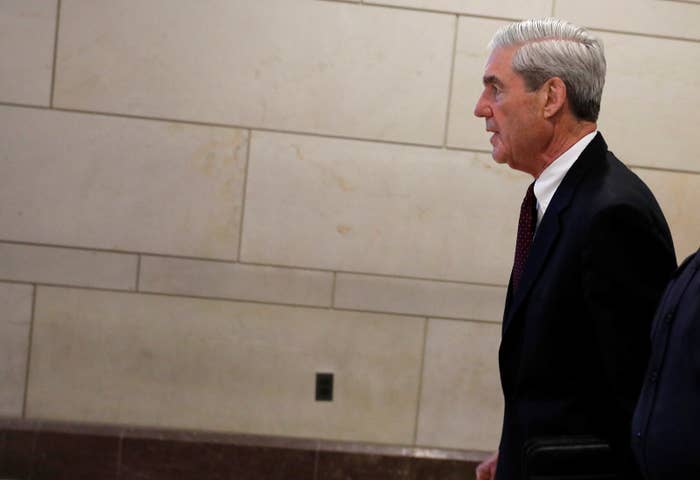
If President Trump ousted Robert Mueller tomorrow, it wouldn't automatically make a grand jury that Mueller convened go away.
The Wall Street Journal and Reuters reported Thursday afternoon that Mueller — the special counsel running the Russia investigation — had impaneled a grand jury in Washington, DC. Reuters separately reported that a grand jury had issued subpoenas about a meeting between Donald Trump Jr., a Russian lawyer, and other individuals in June 2016. Ty Cobb, a White House lawyer working on the Russia investigation, said in a statement that he wasn't aware a grand jury had been impaneled. A spokesman for Mueller's team declined to comment.
Although grand juries are responsible for deciding whether to return a criminal indictment, that's not their only function.
Grand juries aid prosecutors in investigations, and so the news that Mueller has convened one does not mean that criminal charges are coming anytime soon, if at all.
They operate in secret, but general information about how grand juries function is spelled out in federal law, Justice Department guidelines, and court rules. Federal grand juries have a maximum of 23 members, but only need 16 people present for a quorum. To return an indictment, only 12 out of 16 grand jurors have to vote yes.
Given the control that prosecutors have over what information gets presented to the grand jury, a judge once famously quipped that a prosecutor could get a grand jury to "indict a ham sandwich."
Grand jurors in the District, like regular jurors, are summoned randomly from a pool of eligible residents. Federal grand juries in DC normally serve 18-month terms, although they only sit for about eight days per month.
The existence of a grand jury means that prosecutors can issue subpoenas for witnesses to testify and for documents and other records.
Although the subpoenas are issued on behalf of the grand jury, the grand jurors typically don't sign off on them and, as a result, don't know who is being subpoenaed until prosecutors present them with witnesses or evidence.
Grand jury proceedings are supposed to be secret, but that secrecy can become harder to police once subpoenas go out and the circle of who knows about the grand jury widens.
Prosecutors don't have to present grand jurors with all of the information that they issue subpoenas for, but the Justice Department requires prosecutors to present any exculpatory evidence that they're aware of — evidence that would help exonerate the person suspected of a crime — to the grand jury before seeking an indictment.
Grand jury witnesses appear without a lawyer, and there is no cross-examination after they're questioned by the prosecutor, although witnesses can ask to leave the room to speak with an attorney. Witnesses can invoke their Fifth Amendment right not to testify.
The prosecutor asks questions first, followed by the grand jury's foreperson and the other members of the grand jury.
If Mueller were ousted, the grand jury would remain in place.
The grand jury remains impaneled either until its term expires or the prosecutor disbands it. With Attorney General Jeff Sessions recused from the Russia investigation, Deputy Attorney General Rod Rosenstein is the only official with the power to fire Mueller under current federal regulations. It would be up to whoever assumes responsibility for the Russia investigation to decide what happens to the grand jury.
To return an indictment, the grand jury has to find that the government presented sufficient evidence of probable cause to bring the case to a trial. That's a different standard than that of a trial jury, which has to decide if a person is guilty of a crime beyond a reasonable doubt.

